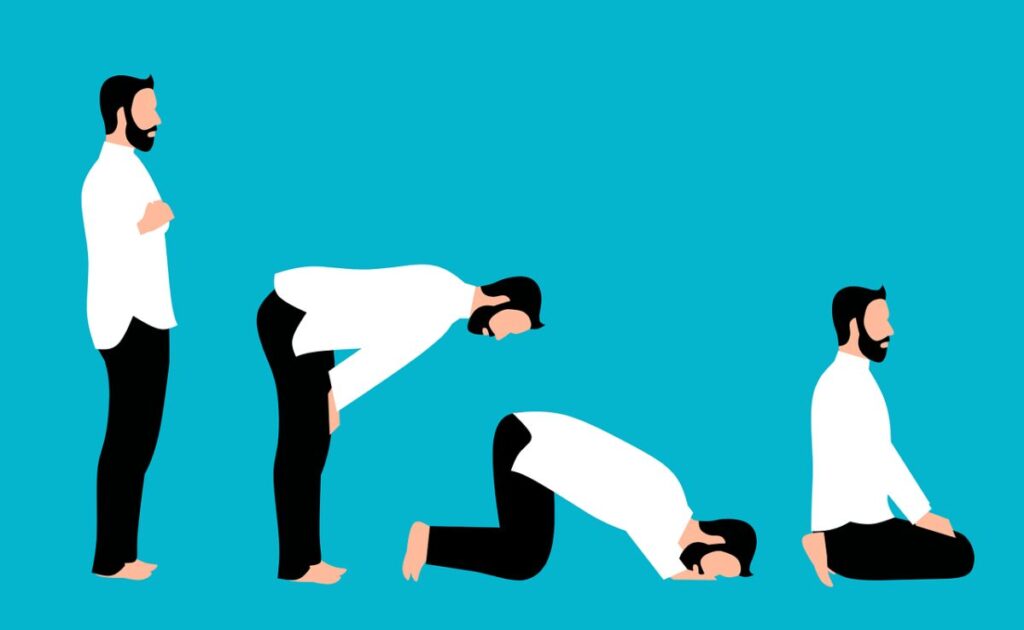Contents:
- The concept of Salah in Islam.
- The ruling on Salah in Islam.
- The importance of Salah in Islam.
- When was Salah imposed in Islam?
- Types of Salah in Islam.
1. The concept of Salah in Islam:
“Salat is an act of worship with specific and known words and actions that begin with the takbir and end with the salutation.”
What is meant by sayings is:
- Reading (reciting Quran al quran)
- Takbir (saying “Allahu Akbar”)
- Tasbih (Glory be to my Lord, the Greatest/The Most High)
- Supplication (supplication to Allah Almighty)
What is meant by verbs:
- Standing
- Kneeling
- Prostration
2. The ruling on Salah in Islam:
Salah in Islam is an obligation.
It is also the second pillar of Islam. The Prophet, may God bless him and grant him peace, said: “Islam is built on five things: bearing witness that there is no god but God and that Muhammad is the Messenger of God, establishing prayer, paying zakat, fasting during Ramadan, and performing the Hajj to the House for whoever is able to make a way to it.”
3. The importance of Salah in Islam:
Salah is considered one of the distinctive acts of worship in Islam, and it is the first thing for which a servant will be held accountable on the Day of Resurrection, as the Prophet, may God’s prayers and peace be upon him, said: “The first thing for which a servant will be held accountable on the Day of Resurrection regarding his work is his prayer. If it is correct, then he has succeeded and succeeded. If it is corrupted, then he will be disappointed and lose. If it is diminished, then he will be disappointed and lose. Of his obligatory prayers, the Lord Almighty said: Look, does My servant have any voluntary actions by which he may complete what he lacked from the obligatory prayers? Then the rest of his work will be according to that.”
Salah in Islam is also the reason for success and salvation on the Day of Resurrection, as God Almighty said in the Holy Qur’an: “Indeed, the believers have succeeded * those who are humble in their prayers.”
4. When was Salah imposed in Islam:
Salah was imposed in Islam during the events of the Night Journey and Mi’raj.
(When God took our Prophet Muhammad, peace and blessings of God be upon him, from the Sacred Mosque to Al-Aqsa Mosque, then ascension to heaven on the same night).
Scholars differed in determining the exact night of the Isra’ and Mi’raj. Some scholars said that it occurred two years before the Hijra, and it was said that it occurred three years.

5- Types of Salah in Islam:
1- The obligatory Salah:
– These are the five obligatory prayers, which God Almighty has imposed on us.
The number of obligatory prayers: five prayers per day, which are:
1- Fajr Salah :
The dawn Salah begins with the rising of the second dawn and continues until the appearance of light and the disappearance of darkness.
Number: two rak’ahs.
2- Dhuhr Salat :
The noon Salat begins when the sun tilts toward the west from the middle of the sky, and its time continues until the amount of the shadow of an object becomes equal to it.
Number: four rak’ahs.
3- Asr Salat:
The afternoon Salat begins when the noon time ends, and continues until the sun turns yellow.
Number: four rak’ahs.
4- Maghrib Salat:
Maghrib Salat begins at sunset and continues until the red twilight disappears.
Number: three rak’ahs
5- Isha Salat:
The Isha Salat begins at the end of the Maghrib time and continues until midnight. This is the time of choice, and there is the time of necessity. It begins from midnight until the time of the second dawn and is for those who have excuses.
Number: four rak’ahs.
2- Sunnah Salat
It is divided into:
1- The regular Sunnahs: It was given this name to continue performing it, and the regular Sunnah is the confirmed Sunnah.
Its time: Pray before and after the obligatory prayers.
Number: Twelve rak’ahs, as the Prophet, may God’s prayers and peace be upon him, said: “Whoever prays twelve voluntary rak’ahs every day and night, not obligatory, God will build for him a house in Paradise.”
2- Non-regular Sunnahs: They were given this name because they are not related to the obligatory prayer.
Examples of non-permissible Sunnahs:
– Witr prayer: It begins after dinner until dawn.
– Night prayer: It starts from night until dawn.
– Ramadan prayer: It is called Tarawih.
–Duha prayer: It begins from the rising of the sun until it moves from the middle of the sky to the west.
– Istikhara prayer: It is the prayer that a Muslim performs when he wants to do something permissible but wants to consult God, so the Muslim prays two rak’ahs.
The Muslim says this supplication in the Istikhara prayer: (O God, I ask You for guidance through Your knowledge, and I seek Your authority through Your ability, and I ask You of Your great bounty; for You have power and I am not able, and You know and I do not know.) And You are the Knower of the Unseen. Oh God, if You know that this matter is good for me in my religion, my livelihood, and the outcome of my affairs – Or he said: My immediate and future affairs – so ordain it for me and make it easy for me, then bless me in it, even if you know that this matter is bad for me in my religion, my livelihood, and the outcome of my affairs – or he said: In my immediate and future affairs – So turn him away from me and turn me away from him, and ordain for me what is good wherever it may be. Then he satisfied me, he said, and named his need.
– Prayer of praise: Scholars differed regarding its ruling.
This is what is mentioned about prayer in the Qur’an and the authentic Sunnah, and this is a thread from the iceberg, but I made sure that the article was comprehensive and simple at the same time so that the reader would get full benefit.. For more important Islamic topics, you can visit our website (https://quranmoddaker.com/blog/)
You can also see the courses for teaching Arabic, the Qur’an, Tajweed, and islmic courses we offer from here https://quranmoddaker.com/courses/


Pingback: prayer salah Rulings in Islam - Quran Moddaker Academy
Pingback: An overview of Islam _ Definition , Five pillars , History , Characters and practices - Quran Moddaker Academy